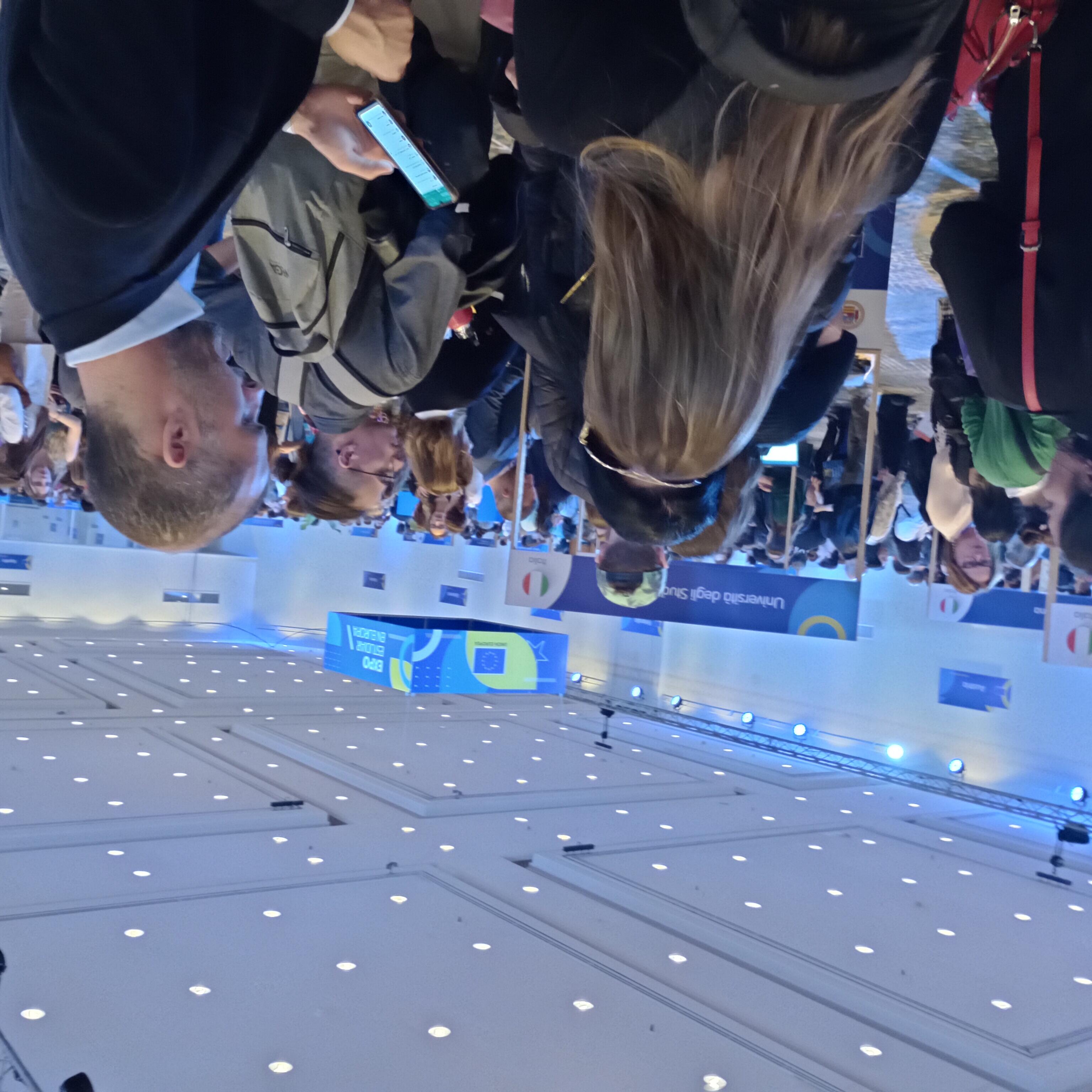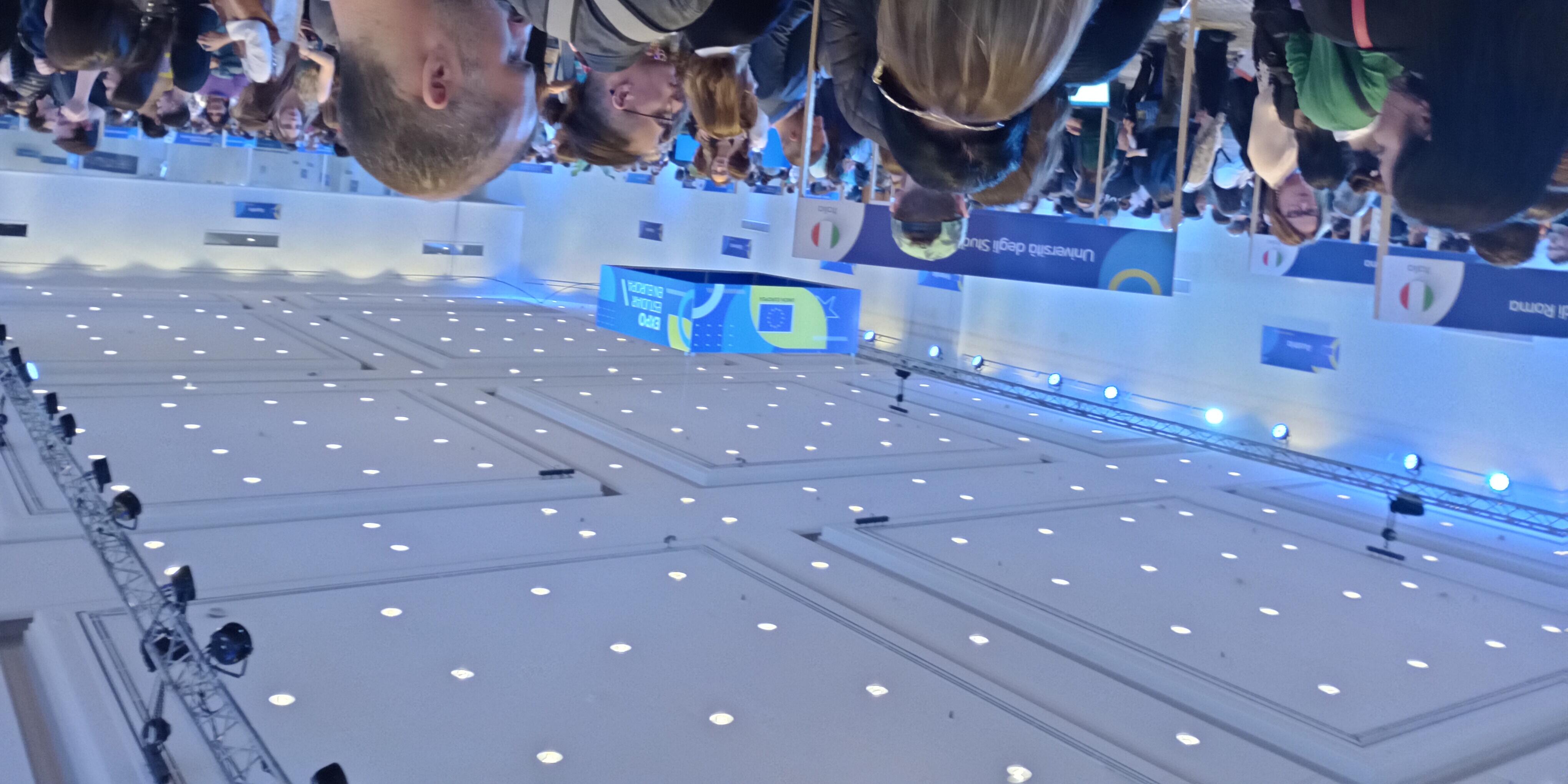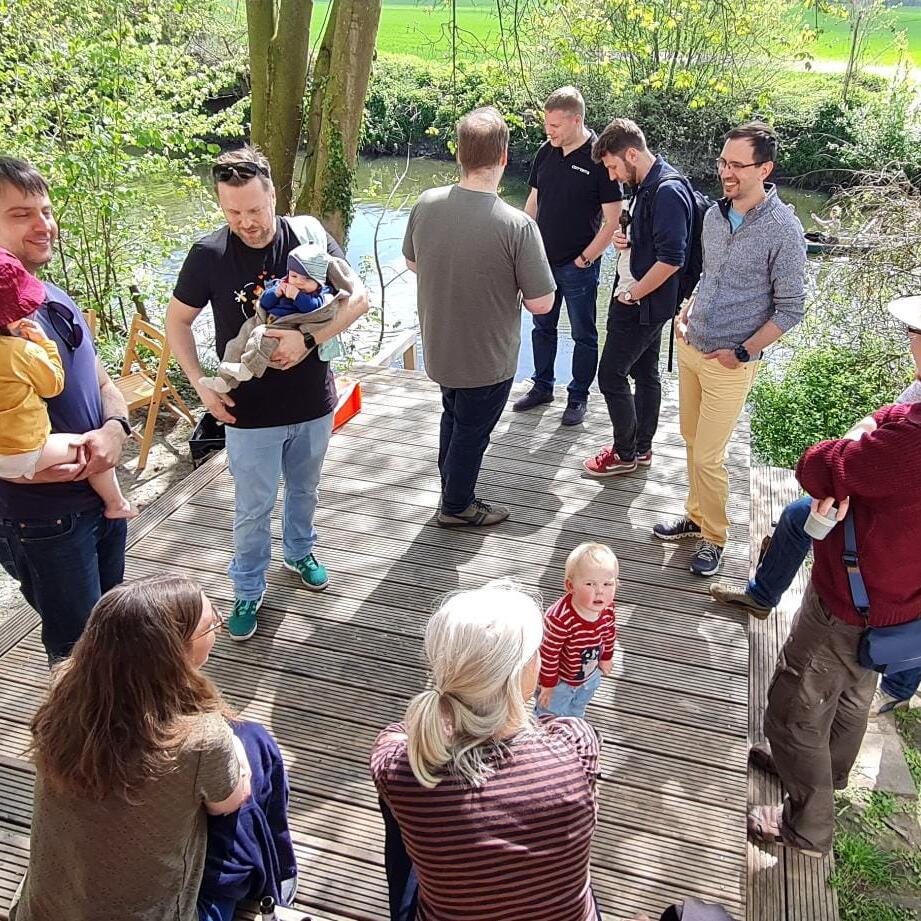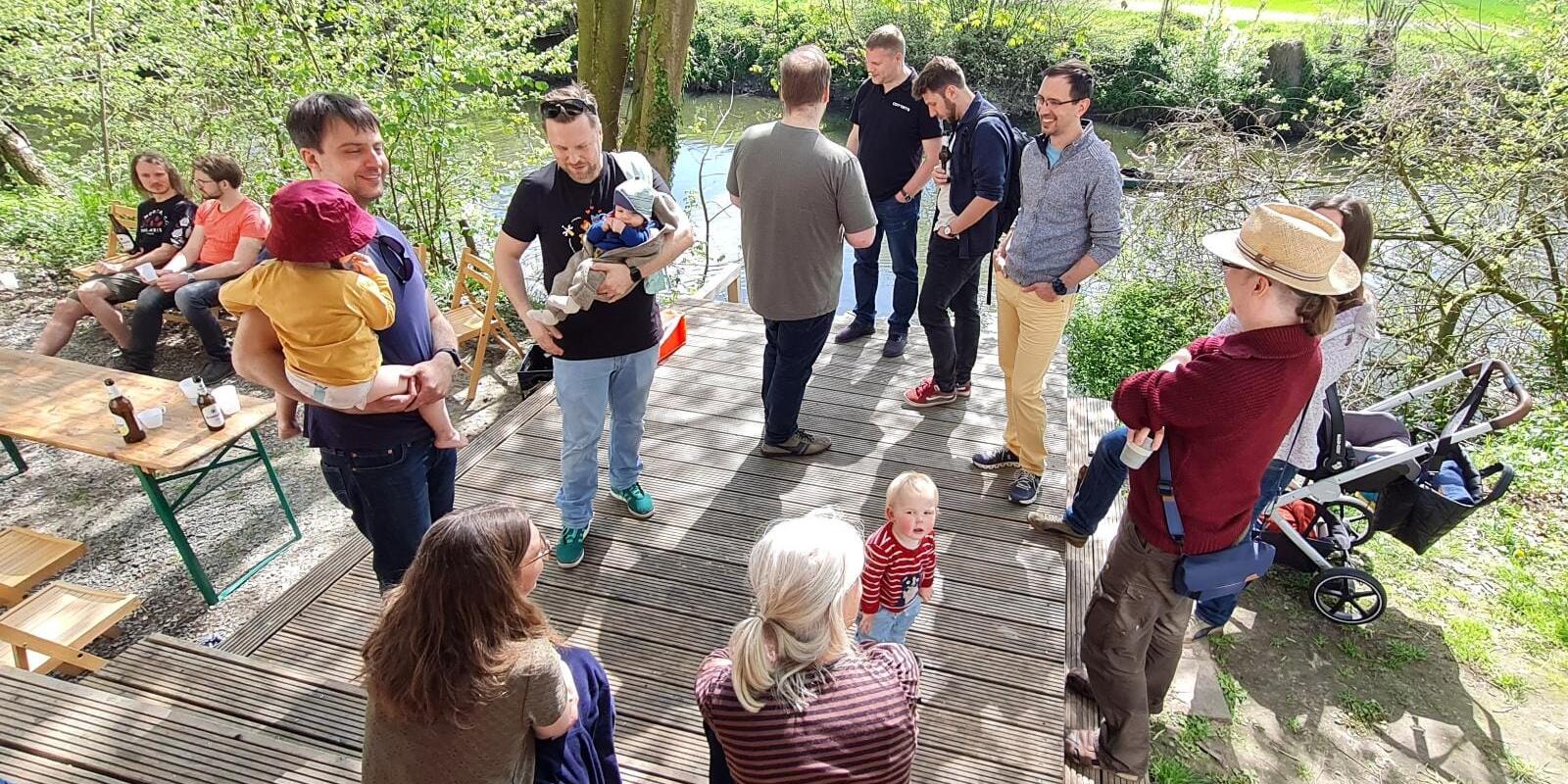Aktuelles
Das Institut für Geoinformatik stellt hier Informationen über aktuelle Forschungsergebnisse und -projekte, Stellenausschreibungen sowie allgemeine Studieninformationen bereit.
Das Institut für Geoinformatik stellt hier Informationen über aktuelle Forschungsergebnisse und -projekte, Stellenausschreibungen sowie allgemeine Studieninformationen bereit.
Dienstag, 03. Dezember 2024 - 15:00, Foyer des Schlosses, Schlossplatz 2, 48149 Münster
Am 03. Dezember findet der Jobhub IT - die IT-Karrieremesse der Universität Münster - statt. Alle Studierenden aus IT-bezogenen Studiengängen, unabhängig von ihrer bisher absolvierten Semesterzahl, sind herzlich eingeladen, sich über mögliche Praktika, Abschlussarbeiten in Zusammenarbeit mit Firmen, Stellen als Werkstudent:innen oder über Positionen für einen Karriereeinstieg zu informieren.
Folgende Unternehmen nehmen an der Karrieremesse teil: AGRAVIS Raiffeisen AG, Ärzteversorgung Westfalen-Lippe, best practice consulting AG, con terra GmbH, DMI GmbH & Co. KG, Finanz Informatik GmbH & Co. KG, GWS mbH, items GmbH & Co. KG, LVM Versicherung, mindsquare AG, MGRP GmbH, OVSoftware GmbH, pco GmbH & Co. KG, Provinzial Nord West, Sopra Steria Custom Software Solutions GmbH, viadee Unternehmensberatung AG.
Eine Anmeldung ist nicht erforderlich.
Der Jobhub IT wird vom Institut für Angewandte Informatik unter Leitung von Prof. Dr. Benjamin Risse organisiert.


Despite decades of research, psychological theories on how people perceive and use space are rarely utilized in building design. Many psychological theories do not generalize beyond laboratory experiments and are incapable of making realistic predictions for practical design problems.
To bridge this gap, we are recruiting a PhD candidate to work on bringing psychological concepts into architectural software in the form of computational functions predicting, for example:
This is an interdisciplinary problem at the overlap of geoinformatics (spatial computing), spatial cognition (psychology), and architecture. An ideal candidate will have an MA or MSc degree (or be close to finishing) in one of the above disciplines and experience with one or more of the following techniques:
The scholarship is 2000 euro / month for 36 months (with an initial contract for 14 months, subject to extension after a positive evaluation in month 12).
Muenster is a cycling-oriented, green, mid-sized city with vibrant student scene and very high quality of life. Our English-speaking Institute for Geoinformatics at the University of Münster is home to 5 research labs, highly international mix of students and employees, and state-of-the-art infrastructure. Intercontinental Dusseldorf airport is reachable with a direct train in 90 min.
If you're interested, please submit:
as a single pdf to ifgi-orga@uni-muenster.de.
If applicable, please highlight concrete examples of your experience with the above-mentioned technique(s).
For questions contact Jun.-Prof. Jakub Krukar: krukar@uni-muenster.de
http://sparc.uni-muenster.de
http://krukar.staff.ifgi.de
Submission deadline is December 3rd.
Starting date is flexible but April 1st the latest.
All documents must be provided in either German or English languages, along with certified translations of all official documents. For the E-Mail submission only digital versions are required. Selected candidates will be invited for an online or in-person interview.
45,000 students and 8,000 employees in teaching, research and administration, all working together to shape perspectives for the future – that is the University of Münster (WWU). Embedded in the vibrant atmosphere of Münster with its high standard of living, the University’s diverse research profile and attractive study programmes draw students and researchers throughout Germany and from around the world.
The Institute for Geoinformatics (ifgi) in the Faculty of Geosciences at the University of Münster, Germany, is seeking to fill the position of a
Postdoctoral Research Associate
Wissenschaftliche/r Mitarbeiter/in
(salary level TV-L E 13, 100 %)
for the externally funded project “Erasmus Mundus Master in Geospatial Technologies”. We are offering a fixed-term full-time position to be filled by 1 March 2024 and continuing until 31 August 2027.
The project “Erasmus Mundus Master in Geospatial Technologies” (https://mastergeotech.info) is a joint European master’s programme run by three university partners in Portugal, Spain and Germany. WWU is coordinating the programme. The advertised position will contribute towards the implementation of this programme. The candidate will join the situated computing lab at ifgi, which conducts research in areas such as location-based services, smart cities and human-computer interaction in the context of solving spatial problems. The position also provides opportunities to further your own academic development andoffers great freedom with regard to your own research, teaching and proposal writing.
More information and the complete job discription can be found here
The Institute for Geoinformatics (ifgi), University of Münster, Germany, is one of the world-wide leading institutions in geospatial information science (GI Science) research. The MSc in Geoinformatics and Spatial Data Science will enable students to further develop their problem-solving skills, to acquire analytic capabilities, and to learn about innovative and creative scientific research methods. ifgi also offers Master students the opportunity to get personally involved in cutting-edge research projects. The medium of instruction is English.
ifgi provides a four-semesters scholarship (April 1, 2024 – March 31, 2026) to one international student (nationality and residence in the 3 years before the application deadline in South- or Central-America). Applicants need to hold a Bachelor degree in Geoinformatics or a similar topic. As for course contents, requirements, and application procedures, please see https://master-geoinformatics.com.
The ifgi scholarship includes
Applications are requested by November 30th, 2023
Study program coordinator: Prof. Dr. Edzer Pebesma, edzer.pebesma@uni-muenster.de
The Institute for Geoinformatics (ifgi), University of Münster, Germany, is one of the world-leading institutions in geospatial information science (GI Science) research (http://www.uni-muenster.de/Geoinformatics/). The Graduate School for Geoinformatics at ifgi this year offers up to three full PhD scholarships for open topics linked to one of the research groups (labs Pebesma, Kray, Schwering, Risse) at ifgi (applicants should specify the research group/professor that their topic is linked to).
The ifgi PhD scholarships include
Applications are requested by December 3, 2023, via email to the ifgi secretariat, ifgi-orga@uni-muenster.de. Questions regarding the open topic can be sent to the corresponding group lead/professor.
Further information: https://www.uni-muenster.de/Geoinformatics/en/Studies/study_programs/PhD/
Geoinformatiker der Westfälischen Wilhelms-Universität Münster haben gemeinsam mit Kolleginnen und Kollegen der Universitäten Sheffield, Toulouse und Edinburgh eine neue Methode basierend auf Künstlicher Intelligenz (KI) entwickelt, mit der sie Insekten in ihrer natürlichen Umgebung präzise untersuchen. Die Methode wurde am Beispiel von Wüstenameisen angewandt, um zu verstehen, wie diese Insektenart in ihrer Umgebung nach Futter sucht, Orte wiedererkennt und den Weg zurück zum Nest findet.
Mithilfe eines Datensatzes von 151 Videos, in dem einzelne Ameisen vom Verlassen ihres Nestes auf der gesamten Futtersuche verfolgt wurden, hat das Forschungsteam neue Erkenntnisse über das Verhalten der Ameisen entdeckt: Die Insekten lernen sehr schnell und prägen sich die Route zurück zum Nest nach nur einer erfolgreichen Wegstrecke ein. Zudem entwickeln die Ameisen verschiedene Wegstrecken über die Zeit, was darauf hindeutet, dass die Tiere unterschiedliche Strategien zur Erkundung ihrer Umgebung verwenden. Außerdem ermöglicht die hohe Präzision des Verfahrens, sogenannte oszillierende Bewegungen der Ameisen zu untersuchen, die für das menschliche Auge nahezu unsichtbar sind. Die Studienergebnisse sind in dem Fachmagazin Science Advances veröffentlicht.
Zum Hintergrund, Methodik und Informationen zur Originalpublikation

